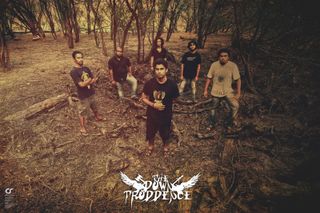An introduction to Indian prog metallers The Down Troddence
Whenever the subject of musical preference comes up in conversation with people, the reactions I encounter fall broadly into three categories. The most common is the blank stare, followed by a (usually perfunctory) “so, what exactly is prog?” The least common response, unfortunately, is a variation of “Prog? Really? Me too! What’s your favourite Rush era?” More common, and the most irksome is “Oh, Dream Theater? Yeah, I used to like them too, then I discovered this really obscure latin-jazz-ambient-triphop-electro-pop band. Now that’s real music! They write real songs- it’s not about showing off. Some day you’ll move past Dream Theater and learn to appreciate `LGMn723’” (or whatever the standard name for one of those bands might be).
The “someday you’ll outgrow x” speech, which followed me for years, was especially common when I was a teenager in Bangalore in love with metal, as so many of us were at the time. Much to my chagrin, several of my friends who were ardent metal heads when we were fifteen have, in fact, fallen out of love with the genre over the years. I console myself with the knowledge that I, too, have given up much of the literature, film and television which occupied me at that age, but the love for metal has stayed deep. It was through metal that I was exposed slowly and caringly to other genres; Dream Theater added prog to my metal, Cynic added jazz, Porcupine Tree added pop and electronic music, Pain of Salvation added funk and traces of hip-hop, among much else. My base metal was turned to gold at the hands of these alchemists.
I am convinced that I am not alone in feeling this way about metal. The most recent corroboration of this sentiment came when I discovered The Down Troddence. This is, first and foremost, a metal band. The necessary tropes are all there- stellar riffs, pounding double bass drumming, intricate lead guitar work and intense, often brutal vocals. But what makes The Down Troddence stand apart is their tantalising take on Indian folk, classical music and metal. One word used to describe them has been ‘fusion’, an appropriate enough description, but one which often suggests a juxtaposition of two genres. This is not fusion à la Shakti - it is fusion à la Devin Townsend. Not one genre placed alongside another, rather a genre viewed through the lens of another. The result is an idiosyncratic amalgam, one which is simultaneously intellectually puzzling and viscerally stimulating.

The reason I referred to their take on traditional Indian music as ‘tantalising’ is that, for all its ingenuity, the truly progressive songs only really account for the second half of their debut album How Are You? We Are Fine Thank You. As if asserting the band’s metal credentials, the first half of the album consists of relatively straightforward, though superbly crafted songs (the brilliant slide riff in Hell Within Hell is a fleeting glimpse of what is to come in the second half of the album).
Things really take off in the breakdown section of Navgalli, a percussive attack that does for Carnatic percussion what Sepultura’s Roots Bloody Roots did for Brazilian. As the song fades out to the chorus of Carnatic vocals, it sets up what is arguably the highlight of the album. Built around a main riff that is somehow ethereal and brutal at the same time, Forgotten Martyrs is the kind of song that makes one stand up and take notice. It is not altogether surprising that the guitar solo, a show-stealing guest performance by Baiju Dharmajan, seems to capture the essence of The Down Troddence. It is almost as if, as an outsider, Dharmajan, himself a seasoned fusion player, saw what was exciting and unique about the band and distilled it into half a minute of exquisite beauty.
The momentum built up by those two songs is slightly dissipated by the next two, but Shiva brings things back on track. The closer, Chaapilla brings things down again. The pacing of this part of the album is frustrating and, unfortunately, means that the album’s third and final act does not quite live up to the promise of the first two. How Are You? We Are Fine Thank You ultimately falls short of being a masterpiece. It is, however, an immensely accomplished debut that unambiguously suggests that the band’s true masterpiece is not too far away.

